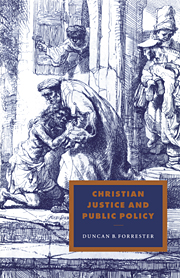Book contents
- Frontmatter
- Contents
- General editors' preface
- Preface
- Introduction
- PART I JUSTICE IN DISPUTE
- PART II POLICIES AND PRACTICES
- 3 Punishment and prisons
- 4 Poverty
- PART III THEORIES AND THEOLOGIES
- PART IV THEOLOGICAL FRAGMENTS
- Select bibliography
- Subject index
- Name index
- CAMBRIDGE STUDIES IN IDEOLOGY AND RELIGION
4 - Poverty
Published online by Cambridge University Press: 02 November 2009
- Frontmatter
- Contents
- General editors' preface
- Preface
- Introduction
- PART I JUSTICE IN DISPUTE
- PART II POLICIES AND PRACTICES
- 3 Punishment and prisons
- 4 Poverty
- PART III THEORIES AND THEOLOGIES
- PART IV THEOLOGICAL FRAGMENTS
- Select bibliography
- Subject index
- Name index
- CAMBRIDGE STUDIES IN IDEOLOGY AND RELIGION
Summary
We have seen how when ‘nobody knows what justice is’, when there is deep uncertainty and frequent changes of mind leading to reversals of policy, the difficult business of organising and running ‘just prisons’ becomes even more complex, confusing and difficult. And we have also seen how insights into justice sometimes emerged from those in the situation, struggling with it and seeking to transform and humanise it.
In such a moral climate it is also very difficult to understand and respond rightly to poverty. While no one denies that imprisonment should be an agency of justice, and many of the disagreements arise from conflicting views on what justice is, some people see poverty as a central issue of social justice while others deny that it has anything to do with justice. The whole notion of social justice is vigorously debated, with some thinkers like Hayek treating it as no more than a dangerous and misleading will-o'-the-wisp, while others, like Rawls, see it as the central component of the concept of justice. In this chapter we examine poverty, and we shall discover that the way we understand poverty, how we respond to it, and our fundamental values and beliefs are inextricably intertwined. There is thus a great deal of confusion today about how we should understand poverty, what it is, how best to respond to it and how to deal justly in relation to poverty as an issue. Construing poverty and its causes, and fashioning policies to deal with poverty which have a claim to be just, are matters of intense, inconclusive and often acrimonious debate.
- Type
- Chapter
- Information
- Christian Justice and Public Policy , pp. 86 - 110Publisher: Cambridge University PressPrint publication year: 1997

